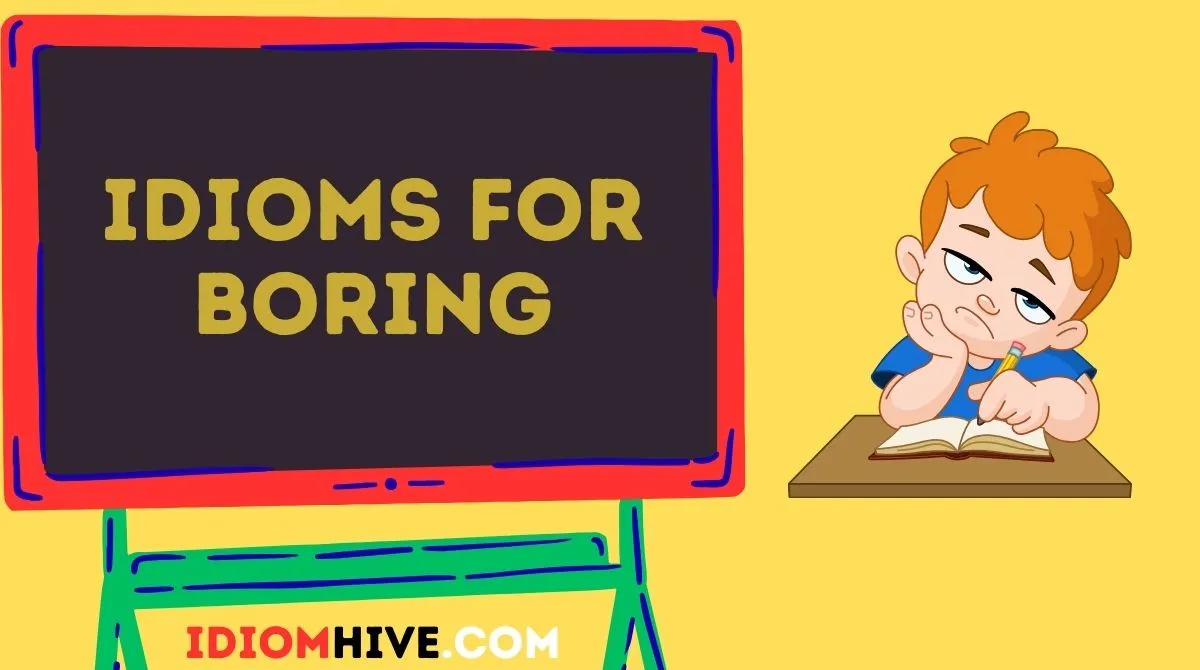Language is more than just words—it’s a way to express emotions, ideas, and even personality. One of the best ways to add flavor to English is through idioms.
Idioms are phrases whose meanings are different from their literal words. For example, saying something is “like watching paint dry” doesn’t mean someone is actually staring at a wall—it means the situation is extremely boring.
When it comes to conversations, writing, or even professional communication, sometimes the word boring feels too plain. That’s where idioms for boring come in handy.
They allow you to describe dull situations, monotonous routines, or uninspiring people with more creativity. Learning these idioms helps you sound natural, funny, and expressive in English.
Whether you’re writing an essay, chatting with friends, or describing a dull meeting at work, these idioms will bring your language to life.
Did You Know?
The English language has hundreds of idioms about boredom—from old sayings used in the 1800s to modern ones like “Netflix and chill” that show how boredom changes with time. Interestingly, most idioms about boredom compare dullness to slow activities (like watching grass grow) or repetitive routines (like a broken record).
Idioms for Boring
Below is a list of 42 idioms for boring, divided into helpful groups so you can remember and use them more easily.
Idioms Comparing Boredom to Slow or Dull Activities
Watching Paint Dry
Meaning: Something extremely dull.
Sentence: The lecture was like watching paint dry.
Alternative: Watching grass grow.
Note: Common in casual speech when complaining about events.
Watching Grass Grow
Meaning: Describes something painfully boring.
Sentence: Waiting for the bus felt like watching grass grow.
Alternative: Slow as molasses.
Note: Informal, often used in everyday conversations.
Dead as a Doornail
Meaning: Lifeless or dull.
Sentence: The party was dead as a doornail after 10 p.m.
Alternative: Dead as a graveyard.
Note: Works for events, conversations, or places.
Like a Wet Blanket
Meaning: A person who ruins the fun and makes things dull.
Sentence: Don’t be such a wet blanket—join the game!
Alternative: Killjoy.
Note: Informal, often describing people.
A Snooze Fest

Meaning: Something boring enough to make you sleepy.
Sentence: That three-hour meeting was a snooze fest.
Alternative: Yawn-inducing.
Note: Modern and casual, especially in workplace chatter.
Flat as a Pancake
Meaning: Dull, without excitement.
Sentence: The comedy show was flat as a pancake.
Alternative: Fell flat.
Note: Works in entertainment or performance reviews.
Dull as Dishwater
Meaning: Very boring.
Sentence: The novel was dull as dishwater.
Alternative: Bland.
Note: Old-fashioned but still understood.
As Exciting as Watching Ice Melt
Meaning: Painfully boring.
Sentence: The film was as exciting as watching ice melt.
Alternative: Watching grass grow.
Note: Used for humor in daily speech.
Idioms About Monotony and Repetition
Same Old Story
Meaning: Something repetitive and uninteresting.
Sentence: His excuses are always the same old story.
Alternative: Same old, same old.
Note: Informal, everyday use.
Broken Record
Meaning: Someone repeating the same thing over and over.
Sentence: She sounded like a broken record complaining about her job.
Alternative: On repeat.
Note: Popular idiom in modern English.
Going Through the Motions
Meaning: Doing something without energy or enthusiasm.
Sentence: He was just going through the motions during practice.
Alternative: Half-hearted effort.
Note: Useful in work and study contexts.
Nothing to Write Home About
Meaning: Not special or interesting.
Sentence: The food was fine but nothing to write home about.
Alternative: Average, ordinary.
Note: Neutral and polite way to say boring.
Same Old Routine
Meaning: Repetitive daily life.
Sentence: My week has been the same old routine—work, eat, sleep.
Alternative: Stuck in a rut.
Note: Common in casual life conversations.
Stuck in a Rut
Meaning: Trapped in a boring and repetitive situation.
Sentence: I feel stuck in a rut at work.
Alternative: Same old routine.
Note: Often used when talking about careers or daily life.
On Autopilot
Meaning: Doing things automatically, without thought.
Sentence: She drives to work on autopilot every day.
Alternative: Mechanical.
Note: Modern and widely used in professional settings.
As Dry as Dust
Meaning: Extremely dull, especially text or lectures.
Sentence: The professor’s speech was as dry as dust.
Alternative: Mind-numbing.
Note: Formal and often used in academic contexts.
Idioms Describing Boring People or Conversations
Bore to Tears
Meaning: Make someone very bored.
Sentence: The speech bored me to tears.
Alternative: Bore stiff.
Note: Common in casual speech.
Bore Stiff
Meaning: Extremely bored.
Sentence: I was bored stiff during the workshop.
Alternative: Bore to death.
Note: Informal but very common.
Bore to Death
Meaning: Make someone extremely bored.
Sentence: The documentary bored us to death.
Alternative: Bore stiff.
Note: Daily speech, often exaggerated.
Talk Your Ear Off
Meaning: Talk too much in a boring way.
Sentence: He’ll talk your ear off about his car.
Alternative: Go on and on.
Note: Casual, often humorous.
Long-Winded
Meaning: Talking too much in a dull way.
Sentence: The teacher gave a long-winded explanation.
Alternative: Wordy.
Note: Semi-formal, useful in academic or workplace critique.
All Work and No Play
Meaning: A dull lifestyle without fun.
Sentence: All work and no play makes Jack a dull boy.
Alternative: Too serious.
Note: Often used as a proverb.
Monotone Voice
Meaning: Speaking without variation in tone, making it boring.
Sentence: The lecturer’s monotone voice put us to sleep.
Alternative: Flat delivery.
Note: Works in formal and casual use.
A Stick in the Mud
Meaning: A person who refuses fun.
Sentence: Don’t be a stick in the mud—join the dance!
Alternative: Party pooper.
Note: Informal, usually friendly teasing.
Idioms for Events, Places, or Things That Feel Boring
Nothing Doing
Meaning: No excitement or action.
Sentence: There’s nothing doing in this small town.
Alternative: Dead quiet.
Note: Informal, often about places.
Dead Quiet
Meaning: Silent and dull.
Sentence: The library was dead quiet.
Alternative: Like a graveyard.
Note: Works for describing locations.
Like a Ghost Town
Meaning: A place empty and lifeless.
Sentence: The streets looked like a ghost town at night.
Alternative: Deserted.
Note: Used in writing and speech.
Dead End
Meaning: No excitement or progress.
Sentence: The conversation reached a dead end.
Alternative: Nowhere to go.
Note: Useful in professional discussions.
As Lively as a Cemetery
Meaning: Completely lacking excitement.
Sentence: The bar was as lively as a cemetery.
Alternative: Dead quiet.
Note: Informal, sometimes humorous.
Sleep-Inducing
Meaning: So boring that it makes you sleepy.
Sentence: The lecture was sleep-inducing.
Alternative: Yawn-worthy.
Note: Common in student or work contexts.
Yawn Fest
Meaning: Very boring event.
Sentence: The award show was a yawn fest.
Alternative: Snooze fest.
Note: Modern and casual.
Colorless

Meaning: Without excitement or personality.
Sentence: His speech was colorless and forgettable.
Alternative: Lifeless.
Note: Works in both formal and informal settings.
Ordinary Joe
Meaning: An average, unexciting person.
Sentence: He’s just an ordinary Joe, nothing special.
Alternative: Plain Jane.
Note: Informal but widely understood.
Plain Jane
Meaning: A dull or ordinary woman.
Sentence: She felt like a plain Jane at the party.
Alternative: Ordinary Joe.
Note: Informal, slightly old-fashioned.
How to Use These Idioms in Daily Life
- In Speaking: Use idioms like snooze fest or yawn fest with friends when joking about boring events. In professional settings, softer idioms like nothing to write home about are more polite.
- In Writing: Idioms such as as dry as dust or stuck in a rut make your essays and articles more vivid.
- In Professional Life: When giving feedback, idioms like long-winded or going through the motions describe situations clearly without being too harsh.
Common Mistakes Learners Make With Idioms
- Literal Usage
❌ Wrong: The lecture was like watching the paint actually dry.
✅ Correct: The lecture was like watching paint dry. - Mixing Idioms Incorrectly
❌ Wrong: It was a snooze grass grow fest.
✅ Correct: It was a snooze fest. - Using Informal Idioms in Formal Contexts
❌ Wrong (in a job interview): The meeting was a total yawn fest.
✅ Correct: The meeting was nothing to write home about.
FAQs
1. What does “dull as dishwater” mean?
It means something very boring or uninteresting, often used for books, stories, or conversations.
2. Can I use idioms like “snooze fest” in formal writing?
No, idioms like “snooze fest” are casual. In formal contexts, use “as dry as dust” or “nothing to write home about.”
3. Are idioms for boring used in American and British English?
Yes, though some idioms are more common in one region. For example, dull as dishwater is very British, while snooze fest is more American.
4. How can I remember idioms more easily?
Practice using them in your own sentences, connect them to real situations, and group them by theme (like events, people, or routines).
5. Do native speakers use these idioms daily?
Yes, but often casually. Native speakers mix them naturally into conversations, jokes, and even professional discussions when appropriate.
Conclusion
Boredom is a universal feeling, and English has found creative ways to express it through idioms. From watching paint dry to stuck in a rut, these colorful expressions give you tools to describe dull people, events, or routines more vividly.
Learning idioms not only makes your English sound natural but also helps you connect with native speakers in a fun way.
So next time life feels monotonous, instead of just saying “boring,” try one of these idioms—you’ll sound more fluent and engaging instantly.










